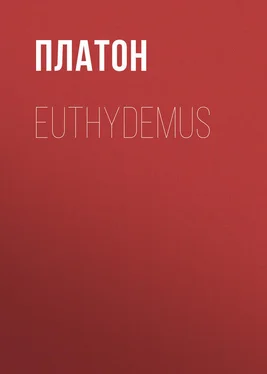The characters of the Dialogue are easily intelligible. There is Socrates once more in the character of an old man; and his equal in years, Crito, the father of Critobulus, like Lysimachus in the Laches, his fellow demesman (Apol.), to whom the scene is narrated, and who once or twice interrupts with a remark after the manner of the interlocutor in the Phaedo, and adds his commentary at the end; Socrates makes a playful allusion to his money-getting habits. There is the youth Cleinias, the grandson of Alcibiades, who may be compared with Lysis, Charmides, Menexenus, and other ingenuous youths out of whose mouths Socrates draws his own lessons, and to whom he always seems to stand in a kindly and sympathetic relation. Crito will not believe that Socrates has not improved or perhaps invented the answers of Cleinias (compare Phaedrus). The name of the grandson of Alcibiades, who is described as long dead, (Greek), and who died at the age of forty-four, in the year 404 B.C., suggests not only that the intended scene of the Euthydemus could not have been earlier than 404, but that as a fact this Dialogue could not have been composed before 390 at the soonest. Ctesippus, who is the lover of Cleinias, has been already introduced to us in the Lysis, and seems there too to deserve the character which is here given him, of a somewhat uproarious young man. But the chief study of all is the picture of the two brothers, who are unapproachable in their effrontery, equally careless of what they say to others and of what is said to them, and never at a loss. They are 'Arcades ambo et cantare pares et respondere parati.' Some superior degree of wit or subtlety is attributed to Euthydemus, who sees the trap in which Socrates catches Dionysodorus.
The epilogue or conclusion of the Dialogue has been criticised as inconsistent with the general scheme. Such a criticism is like similar criticisms on Shakespeare, and proceeds upon a narrow notion of the variety which the Dialogue, like the drama, seems to admit. Plato in the abundance of his dramatic power has chosen to write a play upon a play, just as he often gives us an argument within an argument. At the same time he takes the opportunity of assailing another class of persons who are as alien from the spirit of philosophy as Euthydemus and Dionysodorus. The Eclectic, the Syncretist, the Doctrinaire, have been apt to have a bad name both in ancient and modern times. The persons whom Plato ridicules in the epilogue to the Euthydemus are of this class. They occupy a border-ground between philosophy and politics; they keep out of the dangers of politics, and at the same time use philosophy as a means of serving their own interests. Plato quaintly describes them as making two good things, philosophy and politics, a little worse by perverting the objects of both. Men like Antiphon or Lysias would be types of the class. Out of a regard to the respectabilities of life, they are disposed to censure the interest which Socrates takes in the exhibition of the two brothers. They do not understand, any more than Crito, that he is pursuing his vocation of detecting the follies of mankind, which he finds 'not unpleasant.' (Compare Apol.)
Конец ознакомительного фрагмента.
Текст предоставлен ООО «ЛитРес».
Прочитайте эту книгу целиком, купив полную легальную версию на ЛитРес.
Безопасно оплатить книгу можно банковской картой Visa, MasterCard, Maestro, со счета мобильного телефона, с платежного терминала, в салоне МТС или Связной, через PayPal, WebMoney, Яндекс.Деньги, QIWI Кошелек, бонусными картами или другим удобным Вам способом.









